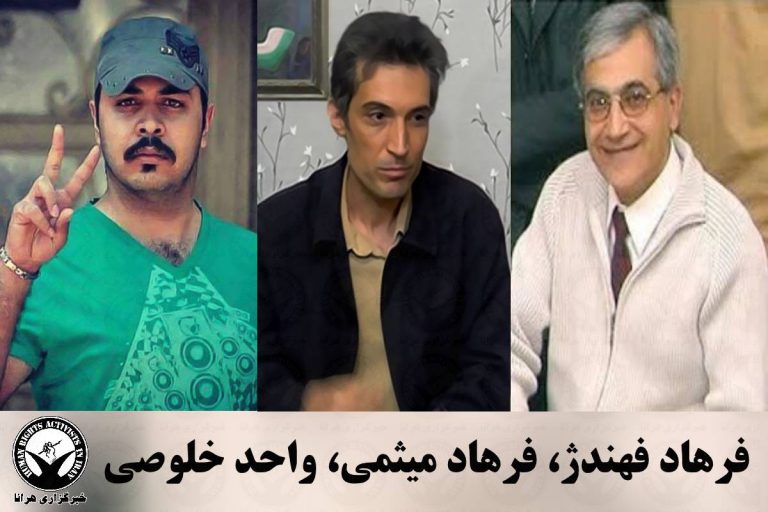Source: www.hra-news.org
Translation by Iran Press Watch

A Report on the Latest Situation of Vahed Kholousi, Farhad Meysami and Farhad Fahandej in Rajai Shahr Prison in Karaj
HRANA– Vahed Kholousi, Farhad Fahandej and Farhad Meysami, three prisoners of conscience, are being held in isolation in a cell in a sub section of a ward of Rajai Shahr Prison. The separation of these prisoners from other inmates in an area that lacks any facilities has added to the difficulty of their detention. The protests of these three prisoners have so far been ignored by prison officials.
According to the HRANA, the news agency of Human Rights Activists in Iran, Vahed Kholousi and Farhad Fahandej, two Baha’i citizens, and Farhad Meysami, a civil and social action activist, are being held in a cell in a sub section of Hall 11 of Ward 4 of Rajai Shahr Prison in Karaj.
Unlike other political prisoners, these three prisoners are being held in the same cell in a sub section of Hall 11 in Ward 4. Due to their small number and the special conditions of their detention, they have been denied access to the minimum security facilities in the prison.
The three prisoners are forced to share their outdoor break area with other inmates, who are foreign nationals who have been accused of joining jihadist groups. This combination, given the conflict of ideology, could have dangerous consequences.
On 17 August 2011, Vahed Kholousi, a human rights activist and Baha’i citizen who had been banned from higher education, received a written summons to report to authorities. Following a visit to the 3rd Branch of Evin Prison’s Prosecutor’s Office, he was detained for 21 days in Ward 2-A of the Islamic Revolutionary Guard Corps (IRGC) at Evin Prison; he later was exiled to Rajai Shahr Prison in Karaj. He was sentenced by Branch 28 of the Tehran Revolutionary Court headed by Judge Mohammad Moghiseh in June 2011 on charges of “acting against national security through community and collusion, membership and effective activism in the Baha’i community and its widespread teaching, membership, and effective activity in education advocacy institutions, and propaganda against the regime”, and was sentenced to five years in prison. This verdict was later upheld in the Court of Appeals.
This Baha’i social action activist was arrested on September 13, 2015, and transferred to Rajai Shahr Prison in Karaj to serve his five-year sentence. He is currently serving his fifth year in prison without even a single day of furlough during this time.
Farhad Fahandej, a Baha’i citizen born in Torbat-e-Heydariyeh, was arrested by security forces on Wednesday, 17 October 2012, at his home in Gorgan. Mr. Fahandej, after serving seven months in prison, was sentenced to ten years of prison by Branch 28 of the Tehran Revolutionary Court, headed by Judge Mohammad Moghiseh, on charges of “propagating the Baha’i Faith and administering the Baha’i Faith”.
Farhad Fahandej is currently serving his eighth year in prison without a day of furlough during the eight-year period in Rajai Shahr prison in Karaj.
This Baha’i citizen was also arrested in 1983 (at the age of 24) and sentenced to six years of prison. He is currently suffering from digestive disorders resulting from the unfavorable conditions of this former imprisonment.
Farhad Meysami was arrested on July 31, 2018 by security forces at his private home in Tehran. The trial court of this social action activist was held on Dec 19, 2018 at Branch 15 of the Revolutionary Court in Tehran, headed by Judge Salavati. He was sentenced to five years in prison on charges of “gathering and colluding with the intent to commit crimes against the national security” and one year in prison on charges of “propaganda against the regime”, as well as two years suspension of any membership in Political and social parties and groups, activity in cyber space, media, and press as well as a two year ban on leaving the country.
If this sentence is upheld in the Court of Appeals and Article 6 of the Islamic Penal Code is applied to his case, he will be sentenced to a maximum sentence of five years in prison on charges of “gathering and colluding with the intent to commit crimes against the national security”.
He was unexpectedly transferred from Evin Prison to Rajai Shahr Prison in Karaj in the late hours of the evening of Saturday, November 9, 2019.
Leave a Reply